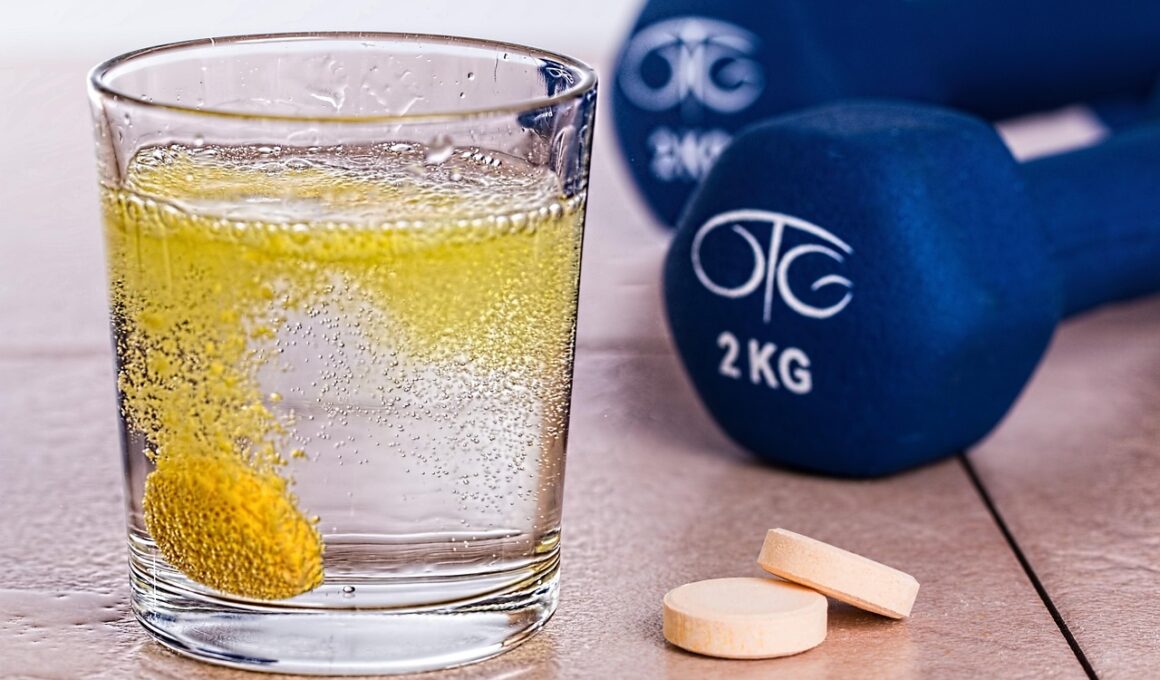Vitamin B Complex and Immune Support for Fitness Enthusiasts
The interactions between various nutrients and their impact on immune function are crucial for fitness enthusiasts. One of the most important groups of vitamins in this regard is the Vitamin B Complex, which includes B1 (Thiamine), B2 (Riboflavin), B3 (Niacin), B5 (Pantothenic Acid), B6 (Pyridoxine), B7 (Biotin), B9 (Folate), and B12 (Cobalamin). Each of these vitamins plays a unique role in maintaining the immune system. This vitamin complex is essential for energy metabolism, which is vital for those who engage in regular exercise. Additionally, B vitamins support the production of red blood cells and aid in the synthesis of DNA, two processes that can significantly enhance overall fitness levels. Therefore, ensuring adequate intake of these vitamins can provide an added layer of support against illnesses, especially during intense training sessions. Food sources rich in Vitamin B include whole grains, poultry, fish, eggs, dairy, legumes, seeds, leafy greens, and bananas. For athletes, the proper absorption of these vitamins becomes even more critical. Incorporating foods rich in B vitamins is a smart strategy for boosting immunity.
A strong immune system is vital for all athletes who wish to perform at their best. Though Vitamin B Complex is significant, there are other key nutrients that can complement its effects. For example, Vitamin C is widely recognized for its immune-boosting properties and is vital in supporting overall health. Zinc is another critical mineral that enhances immune function and is found in foods such as meat, shellfish, legumes, seeds, and nuts. Combining these essential vitamins and minerals can significantly enhance the body’s resilience to infections. Moreover, antioxidants, found in fruits and vegetables, work synergistically with Vitamin B Complex to protect the body against oxidative stress created by strenuous workouts. A diet rich in colorful produce can help combat fatigue and promote recovery. To ensure optimal health, a balanced approach incorporating the right mix of supplements and whole foods may be preferred. Consultation with a healthcare provider or nutritionist can help tailor personal supplement plans to individual needs. Eating well-rounded meals rich in various nutrients is imperative for anyone engaged in fitness training.
Vitamin B12 and Immune Function
Vitamin B12 is perhaps the most well-known member of the Vitamin B Complex, essential for numerous bodily functions including DNA synthesis and red blood cell formation. This vitamin plays a crucial role in supporting the immune system by producing antibodies needed to fight infections. B12 is found naturally in animal products like meat, fish, eggs, and dairy. For vegetarians and vegans, fortified foods or supplements are critical to maintain adequate levels of this important nutrient. Deficiency in B12 can lead to fatigue and a weakened immune response, leaving athletes vulnerable during rigorous training schedules. Regularly monitoring Vitamin B12 levels can aid fitness enthusiasts in staying healthy while reducing the risk of injuries and other related health issues. Furthermore, maintaining optimal B12 levels can help improve energy levels and endurance, which are fundamental components for athletes striving to succeed. Prioritizing B12 intake not only boosts the immune system but can also improve workout performance, assist in recovery times, and promote overall health. Therefore, it is vital to incorporate sources of Vitamin B12 into one’s regular diet.
Another important aspect of Vitamin B Complex is its role in managing stress—both physical and mental. Stress can have a direct effect on the immune system, leading to a higher susceptibility to illness and fatigue. B vitamins, particularly B6, help in the production of neurotransmitters like serotonin, which regulate mood and help to combat stress. When engaged in strenuous physical activities, athletes may experience elevated levels of stress hormones like cortisol. The inclusion of B6 can assist in mitigating these stresses, supporting the immune system by fostering a balanced state of hormone regulation. Whole foods containing this vitamin include chickpeas, fish, potatoes, bananas, and fortified cereals. For those engaging in extreme training regimes, B6 supplementation might also be useful. Adequate stress management through a diet rich in essential nutrients contributes to overall wellness and resilience in athletes. Implementing lifestyle changes in addition to nutritional support can lead to improved psychological well-being. Hence, recognizing the connection between diet, emotional health, and immunity is crucial for comprehensive fitness strategies.
Food Sources of Vitamin B Complex
To effectively reap the benefits of the Vitamin B Complex, it’s important to identify which foods are nutrient-dense and promote immune health. A balanced diet rich in diverse food sources is crucial for athletes looking to enhance performance and support their immune systems. Key sources include whole grains such as brown rice and barley, legumes like lentils and chickpeas, and nuts and seeds including almonds and sunflower seeds. In addition, green vegetables such as spinach and broccoli serve as excellent sources of B vitamins. Animal proteins including lean meats and fish are also optimal as they provide high levels of Vitamin B12, essential for energy metabolism and immune function. Additionally, dairy products like yogurt serve as a source of B vitamins and contribute to gut health, which is integral for overall immune support. Incorporating a variety of these foods into daily meals helps ensure adequate intake of B vitamins. Moreover, being mindful of one’s nutrition through meal planning can lead athletes to achieve better outcomes in both exercise efficiency and immune resilience.
In addition to food sources, supplements can be considered for athletes seeking to optimize their Vitamin B Complex intake. While a well-rounded diet is the preferred method to obtain nutrients, some individuals may not meet their needs through diet alone, making supplementation beneficial. Vitamin B Complex supplements are widely available and can provide a concentrated dose of each B vitamin, aiding in overall health. They can be particularly useful during periods of intensive training or competition when nutritional needs may increase. It is essential for athletes to choose high-quality supplements and consult with healthcare professionals before adding them to their regimen. Recommendations will depend on individual dietary habits, training intensity, and specific health considerations. Furthermore, it’s important to balance supplementation with a diet rich in whole foods to create synergy between nutrients. Understanding the role of each B vitamin allows for informed choices in supplementing, ensuring that athletes fully support their immune systems while pursuing fitness goals. Continuous education on nutrition is vital for all fitness enthusiasts aiming for optimal performance.
Conclusion: Emphasizing Immunity in Fitness Routines
In conclusion, maintaining a strong immune system is paramount for fitness enthusiasts and athletes. Adequate intake of Vitamin B Complex, alongside other essential vitamins and minerals, will help athletes bolster their immune defenses against illnesses. From Vitamin B12, which is crucial for energy and immune support, to the various other B vitamins that assist in stress management and physical performance—each plays a vital role in overall health. Ensuring that a diet rich in Vitamins B1, B2, B3, B5, B6, B7, B9, and B12 is complemented with nutrient-dense whole foods is key. The synergy of nutrients encourages overall well-being and optimizes fitness results. Additionally, for those unable to meet their needs through diet alone, supplementation serves as an effective alternative when chosen with intent. Working closely with healthcare providers can help tailor personal strategies for optimal nutrition, ultimately leading to a robust immune system. With the right mindset, dietary choices, and supplementation, athletes can maximize their performance while reducing the risk of illness, thus enhancing their sports experience significantly.


